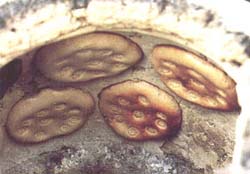
HIGH flame flew up to the sky, and
dry stalks and boxes of cotton blazed up. But then flame settled and
disappeared. Only the stove's mouth shone brightly and a woman bent over it plunging her hand with raw chorek and applying it to heated clay. Some minutes flew
by and the master took brown aromatic
scones as if pierced by sunlight out of the
stove. The first scones broken into pieces
were given to the children gathering round the tamdyr. Then she bent over the
heated stove again putting new choreks
into it.
"At all times for Turkmens bread comes first", the famous Turkmen writer Ata
Durdiyev, the author of the historical bestseller "Keimir Kyor" tells". In Turkmen
folklore there is a proverb: "Bread is the
king of everything . Since childhood we
have been inculcated in quivering at titude to bread: if you drop even a tiny piece
of it, you should pick it up immediately
and put it aside for crumbs not to be trampled down.
My grandmother brought up all our
family of about fifty people living in the
same yard. She put a piece of bread under pillows of those who were ill, feeble
or afraid of something at bedtime to protect them from evil spirits. In the morning
it was eaten. Being young I often go to
business trips throughout Turkmenistan
and my granny always put a piece of chorek into my bag. At first I wondered why
but she answered: "It is not food only,
chorek will be your fellow — traveller, and
protect you".
Then I got to know that setting of a
Turkmen always took a piece of chorek
as a talisman.
No one from the children of the family had a right to open sachak (a table-cloth
which chorek is wrapped up in). They had
to ask their mother who made it herself
and broke off a two-finger piece of chorek. We were inspired with the rule that it
would never do to take bread being unwashed, you must be high-minded as if
you go to mosques.
It is interesting to know that bread remains clean if it is dropped by accident to
the dust. Durt does not stick to it as if it
were sacred. Once I was told a story . In
one of Turkmenistan's districts there was
a leader respected by all, a hereditary peasant. Once he came to a village school.
While going along the corridor accompanied by his assistants, teachers and students
he suddenly noticed a piece of chorek had
dropped by somebody. Immediately he
picked it up and put into his mouth. Then
he began chewing and went on the conversation. Witnesses were impressed.
Many years have passed but that event is
still told from mouth to mouth.

Tamdyr itself as well as bread is considered to be sacred. No one Turkmen
makes up his mind to destroy a tamdyr,
even very old, ramshackle and neglected.
He will not do it even if its owner is not
against it. Coming up to a tamdyr Moslems read their prayers.
In the past some large families built
one good tamdyr. I remember how my
mother sent me to know who was the last
to bake bread. So, fuel was saved, the stove was heated once and then the heat was
kept up. It also showed good-neighbourhood of villagers. When an old traveller
came to a strange village and saw many
tamdyrs, he shook his head, because there people were not friendly. Many tamdyrs were a bad sign. Individual farmers
were not in respect because severe conditions made Turkmens live in communities to overcome troubles together. Every
woman opening a new sack of flour shared the first bread with her neighbours, it
was "khudayoly" (sacrifice).
Since olden days in peasants' farms of
Turkmenistan Kharman-toy (Harvest Day)
is celebrated at threshing-floor after threshing. They prepare dograma, a national
dish make from scones crumbled, pieces
of roasted meat and onions. Different games, the races, wrestling, concerts of bakhshis (folk-singers and musicians) are held.
At present much is done for fulfilment of the Presidential State Programme "Grain". Its main aim is to grow enough wheat to refuse from its import and
supply the people with bread of high
quality. And since olden days every
Turkmen family considers that if they
had six sacks of grain they would live
comfortably for a year.